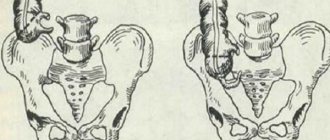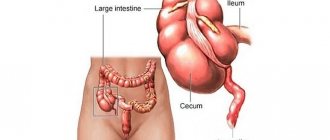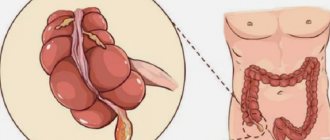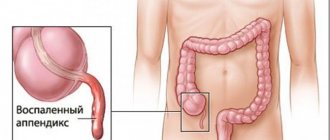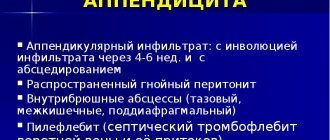The human body is a perfect self-regulating system, which under normal conditions, that is, without the presence of disease, works like a Swiss watch. However, in some cases, the functioning of the body is disrupted, which can lead to life-threatening conditions. For example, the appendix, or the vermiform appendix of the cecum, which makes a significant contribution to immune defense, can become inflamed, resulting in so-called appendicitis. This pathology will be discussed in this article. You will learn what appendicitis is and what preventive measures will help you avoid it.
Functions of the appendix
To understand why the appendix becomes inflamed (appendicitis is a consequence of its inflammation), you need to learn about its structure and functions.
For a long time, the vermiform appendix was considered an atavism. Doctors believed that the organ would lose its digestive function and was needed only when human ancestors ate mainly plant foods, which the appendix helped to digest. The real functions of the appendix were discovered almost by accident. To prevent appendicitis, infants began to have the appendix of the cecum removed en masse. This simple operation was believed to be very easy to handle at an early age. However, the development of the unfortunate babies was very slow, they did not digest food well and often suffered from infectious diseases.
Anatomy and physiology
Thus, the appendix plays a huge role in immunity: the lymphatic tissue of this organ protects against inflammatory processes. In addition, the appendix acts as a reservoir for intestinal microflora. If all the bacteria inhabiting the intestine die, then it will be populated by the “residents” of the cecum.
The appendix is located on the back wall of the intestine. It has a cylindrical shape. The dimensions of the process range from 6-12 centimeters. What is appendicitis? This is inflammation of this very vermiform appendix. Why is this happening? Can appendicitis be prevented? This will be discussed further.
How does appendicitis develop?
The causes of appendicitis are still not fully understood. There are several theories about the development of the disease. There is no consensus on the leading etiological factor in the scientific community.
Possible causes of inflammation of the appendix:
- mechanical blockage of the opening between the cecum and the appendix;
- intraintestinal infection;
- disorders of the nervous regulation of the vessels of the intestinal wall;
- excessive production of serotonin by cells of the APUD system in the appendix;
- disturbances of peristalsis and constipation;
- diet features (lack of plant fiber in the menu, excess protein and fats).
In the early stages of appendicitis, there is swelling of the mucous and submucosal membrane of the appendix, impaired outflow of contents into the cecum, deterioration of microcirculation in arterioles, venules and capillaries, and activation of microflora. The first symptoms of appendicitis are associated with the development of the initial phenomena of inflammation.
Causes of the disease
So what causes the appendix to become inflamed? Appendicitis can be caused by various reasons:
- Bacteria that are carried into the appendix by the bloodstream from the source of inflammation.
- Blockage of the mouth of the appendix with feces.
- The presence of helminths (ascaris or pinworms) in the body.
- Violation of diet. It has been noted that the more fatty meat a person consumes, the higher the likelihood of developing the disease.
- Anatomical features. In some people, the process has a number of bends, the presence of which leads to stagnation.
- Blockage of the arteries that feed the appendix.
At risk are people who have bad habits, abuse tobacco and alcohol. The hereditary nature of the disease has also been proven. Of course, it is not appendicitis itself that is inherited, but a predisposition to it.
Prevention
Appendicitis is a pathology from which you cannot completely protect yourself. However, there are simple recommendations that can minimize the likelihood of developing this disease:
- Do not trigger inflammatory processes in the body.
- You should not use antibiotics without a doctor's prescription. Antibiotics are detrimental to normal microflora.
- Lead an active lifestyle. Physical activity is important for normal blood supply to the abdominal organs.
- Get regular medical checkups.
Atypical course
In some situations, appendicitis occurs atypically. Most often this is due to the non-standard location of the appendix in the abdominal cavity.
Retrocecal appendicitis first symptoms resemble acute intestinal infection (acute intestinal infection). A person is worried about loose stools, possibly mixed with mucus, high body temperature, and symptoms of acute intoxication. Abdominal pain is less pronounced than with the classic version.
With the subhepatic location of the appendix, the pain syndrome is similar to signs of inflammation of the gallbladder, and with the pelvic location, the first symptoms are similar to manifestations of inflammatory processes in the urinary tract or female genital organs. From the digestive system you may be concerned about:
- Diarrhea.
- Bloating.
- Pain of varying severity, localized in the lower abdomen.
Left-sided appendicitis sometimes occurs. The early first signs of the disease will fully correspond to the classic course of inflammation, but they will only be felt on the left side. The development of a left-sided process is associated with increased intestinal mobility or transposition, that is, the reverse arrangement of organs.
An atypical course can also be observed during pregnancy. The pain is most often localized on the right, but not below, as with typical appendicitis, but in the hypochondrium. There is often no temperature, and symptoms of peritoneal irritation are mild.
Due to complete blockage of the appendix, empyema sometimes occurs, which is considered a special case of acute phlegmonous appendicitis. As a result, the appendix is filled with inflammatory contents (pus) and significantly increases in size, visually resembling a mace. The disease develops slowly, and the first signs may be insignificant.
It is quite difficult to make a diagnosis on your own when abdominal pain and the first signs of appendicitis appear, so if you have a stomach ache or other unpleasant sensations, it is better to consult a doctor. Remembering the words of the great surgeon of the last century, Mondor, that the future of acute inflammation of the appendix cannot be predicted, it is better to seek surgical help in a timely manner, already at the first symptoms, thereby significantly speeding up recovery and increasing the chances of a complete cure.
Because of the prevalence of this surgical disease, we are overly confident that we know enough about it. Still, many facts can surprise and help keep us and our children healthy.
What is appendicitis?
We have often heard that a person does not need the appendix, that it has lost its significance.
However, scientists have discovered surprising facts about the function of the appendix.
It has now been established that the appendix is a complex organ and has its own characteristics. It has extensive circulatory, lymphatic systems and elements of the nervous system. Also, in the area of the appendix there are as many nerve endings as in all other parts of the intestine.
What did scientists manage to find out about the functions of the appendix?
1.The appendix produces rhythmic contractions.
2. It secretes lymphocyte cells that participate in the body’s protective and adaptive reactions.
3. The mucous membrane of the appendix secretes antibodies
4. The appendix affects the immune system.
Why does the appendix become inflamed?
Canadian scientists from the University of Toronto are convinced that polluted air, a sign of poor ecology, can cause appendicitis in humans.
Proper nutrition is the best prevention of disease
It is impossible to completely protect yourself from appendicitis. However, if you carefully monitor your diet, you can reduce the likelihood of developing this disease to a minimum:
- Avoid constipation. Constipation causes the death of microorganisms that populate the intestines. As a result, pathogenic bacteria begin to multiply, which can cause inflammation of the appendix. To prevent constipation, drink a glass of warm water half an hour before meals: this will prepare the gastrointestinal tract for eating.
- Eat as many fiber-rich foods as possible. Fiber improves digestion and reliably protects the organs of the digestive system from inflammatory processes. A lot of fiber is found in whole grain bread, as well as fresh fruits and vegetables.
- Always consume protein along with fiber-rich foods: this will facilitate the digestion of food and prevent putrefactive processes in the intestines.
- Drink as many freshly squeezed fruit and vegetable juices as possible.
- Don't eat too many seeds and berries with seeds. Sometimes pieces of undigested food get into the appendix. They injure the walls of the appendix, resulting in inflammation.
- Do not reuse cooking oil. This is very harmful to health: you can “earn” not only appendicitis, but also colitis.
Prevention of appendicitis: how to avoid and prevent appendicitis - prevention in adults
The best way to understand how to avoid appendicitis in childhood or adulthood is to find out the reasons for its occurrence.
The rudiment is affected by the work of the hormonal and immune system. Most often, inflammatory processes occur when the passage of the appendix is blocked, mechanical damage: too hard digested food, seeds from fruits and vegetables, shells.
In childhood, the problem arises due to the child swallowing parts that cannot be processed by enzymes.
Preventive reminder for adults
- Balanced diet, consumption of large amounts of fiber (cabbage, legumes, carrots, cucumbers).
- Refusal of unhealthy fatty and fried foods, fast food.
- Do not swallow parts of foods that cause difficulty in digestion (husks from seeds, fruit and berry seeds, thick hard peels of vegetables and fruits).
- Consult a gastroenterologist annually (the doctor will be able to timely determine the enlargement of the appendix in adults and children).
- Observe personal hygiene standards (wash hands before eating, after visiting the toilet, avoid suspicious-looking eateries).
- After treatment with antibiotics, it is necessary to carry out a course of drugs containing live lacto- and bifidobacteria in order to cleanse the digestive system of aggressive components (the pharmacy chain has a fairly large assortment).
- Do not drink alcohol (aggressive components irritate the gastrointestinal mucosa, which facilitates the penetration of harmful bacteria).
- Strengthen and maintain immunity (inflammation of the appendix occurs against the background of intestinal infections).
- Massage the abdominal cavity in a specialized institution or independently (blood circulation and the digestive process are stimulated).
The reminder is relevant for use not only in adults, but also in children. Compliance with basic rules will help prevent the development of inflammatory processes in the body.
Normal digestion is the basis of prevention
Prevention begins with a change in diet - eliminating harmful, heavy foods that can make the stool too hard.
Important! Frequent constipation causes discomfort in the stomach, disrupts digestion and dramatically increases the risk of acute inflammation of the appendix.
What happens with constant constipation and infrequent bowel movements:
- bacteria begin to accumulate in the digestive tract, disrupting the normal balance of microflora;
- the level of intestinal intoxication gradually increases - inflammatory processes occur;
- with a long course of the pathology, the appendix begins to fester; in advanced cases, the appendix bursts.
You can get rid of regular constipation by drinking a glass of clean water 30 minutes before meals. A spoonful of lemon juice and honey will provide additional benefits to the microflora.
Secrets of good digestion
Massage helps prevent appendicitis. Do it after each meal after 5-10 minutes: gently massage the stomach in a clockwise direction, helping the movement of food. You should not press on the intestines for a long time - 1-2 minutes is enough.
Important! An active lifestyle and moderate exercise is the best way to prevent this dangerous condition.
It is not necessary to overload yourself with strength and cardio training every day; a light walk after meals, morning exercises and active sports 1-2 times a week is enough.
Children's prevention
Acute appendicitis syndrome is extremely rare in children under two years of age (up to 5%). This trend is developing due to special nutrition (food is crushed, extremely balanced) and better functioning of the digestive system (defecation is complete, nothing clogs the lumen of the appendicular process).
To prevent your baby from having inflammation of the appendix, you should:
- Take preventive measures to strengthen the immune system. In childhood, infections and inflammations are more difficult to tolerate. It is impossible to diagnose many diseases in the early stages; complications may begin, which will lead to the development of acute appendicitis.
- Make sure that children do not swallow difficult-to-digest parts of foods (bones, seeds, peels, husks).
- Prohibit children from eating a lot of sweets and overeating (problems with defecation, dysbacteriosis, and helminths may develop).
If you complain of abdominal pain, you should definitely visit a pediatrician and gastroenterologist (sometimes an examination by a surgeon is required).
Medicines cause appendicitis
But how can you avoid appendicitis if your digestion is fine, you exercise regularly, and your stomach sometimes hurts? Pay attention to how many pills and other medications pass through your body each month.
Antibiotics pose the greatest danger to the health of the stomach and intestines. They are available at the pharmacy and do not require a doctor’s prescription, which is why they are taken ad libitum by adults (and sometimes they are given to children at the first sign of a cold).
Try to limit yourself from medications to avoid appendicitis: do not take a pill at the first symptoms of a headache, never be treated with antibiotics without a doctor’s prescription!
Memo for pregnant women
It is extremely difficult for pregnant women to independently understand that abdominal discomfort may be symptoms of acute appendicitis. During gestation, the peritoneum stretches, microcracks appear, which leads to pain. In its advanced form, the disease develops into peritonitis, which is dangerous for both mother and baby.
During pregnancy, the appendix can become inflamed due to:
- Problems with bowel movements. The developing fetus puts pressure on the intestines, the hormones produced slow down the digestive processes, which leads to the accumulation of large amounts of feces.
- Decreased immunity. The woman’s body shares immunity with the child, the functioning of the lymph system decreases.
- Changes in the position of internal organs. The enlarged uterus displaces other abdominal organs, the appendicular process is bent, which leads to blockage of the passage.
For prevention, pregnant women are advised to eat more often, in small portions, eat more foods with a laxative effect, and cleanse. You can cleanse the intestines with enemas or by eating plums, beets, and prunes. It is important to drink kefir at night - it will relieve heartburn and relax the intestinal walls.
Preventive measures are strictly required. The consequences of appendicitis are extremely dangerous; peritonitis may develop, premature birth may occur, etc.
Dietary recommendations
One of the bases for preventing inflammation of the appendix is proper nutrition. The diet should include a sufficient amount of vegetables and fruits. These foods are rich in fiber, which improves intestinal function by activating its motor function. It is useful to include the following products in the menu for the prevention of appendicitis:
- Plums.
- Prunes.
- Apricot.
- Apples.
- Carrot.
- Cabbage.
- Berries.
- Greens and lettuce leaves.
Cereals, legumes and dairy products are also beneficial. They enhance peristalsis and help normalize microflora.
But fried, fatty, smoked foods, sweets, carbonated drinks and alcohol slow down intestinal motility, which favors the development of constipation and its complications.
It is strictly forbidden to consume oil left over from previous cooking due to the negative effect on the gastrointestinal tract.
It is better to combine protein foods with foods rich in fiber. It is useful to drink various natural vegetable juices. Juices from carrots and beets are especially useful. In addition to preventing constipation, proper nutrition helps improve the functioning of the entire digestive tract, including the glands that secrete the enzymes necessary for digesting food.
Prevention of acute appendicitis comes down to a number of measures. Most of them are aimed at preventing fecal retention in the intestines. In general, by following a healthy lifestyle, organizing proper nutrition and performing regular exercise, you can prevent appendicitis, as well as avoid its complications and surgical intervention.
by HyperComments
Preventive nutrition
Simple habits can help reduce the likelihood of developing appendicitis:
- Chewing food thoroughly.
- You should eat slowly.
- Divide meals into 4-5 small portions per day.
- Set a time frame for eating.
- In the evening, eat no later than 2-3 hours before bedtime (intestinal motility slows down at night).
- Snacks should include fiber-rich fruits and vegetables.
Memo of products for the daily diet:
- Apples, pears (pears should be eaten in small quantities, as they “strengthen”);
- Cabbage, cucumbers;
- Tomatoes, carrots;
- Legumes;
- Fresh berries and dried fruits;
- Buckwheat, oatmeal.
It is also useful to use flaxseed oil to prevent constipation and to cleanse the intestines in adults and children over 3 years of age.
Learn this video about appendicitis about complications of appendicitis:
Folk remedies for the prevention of appendicitis in adults and children
An alcohol solution of the foot root is used to prevent appendicitis.
Traditional medicine helps in the prevention of appendicitis. It is important to remember that you should consult a doctor before using such recipes to avoid worsening the condition or unwanted complications. The following folk remedies help prevent appendicitis:
- Cover the roots of the footstep (15 g) with alcohol (150 ml), and store the resulting solution in a dark place for 8 days. It is recommended to use this remedy at the first symptoms of appendicitis (3 drops every 2 hours). After a couple of days, the dosage is increased to 6 drops, diluting the infusion with liquid (water, juice, compote).
- Cover the dried tarragon herb (1 spoon) with a glass of boiling water and then leave for 3-5 hours. After this, filter the broth. The resulting mixture should be consumed before meals. Each time you need to infuse a new portion of the tincture. This remedy is indicated both for preventive purposes and for therapeutic purposes (at the first signs of appendicitis).
- Hot milk can soothe pain during attacks. To do this, mix milk with cumin and cook for 2 minutes. It is recommended to take this drink every 60 minutes during the day.
- White clover (10 g) pour 0.25 cups of boiling water and leave to steep for 20 minutes. Take the prepared decoction 3 times a day.
Recommendations from the author of the article
But even after this period, it is not recommended to immediately start with heavy exercises. In the first few days, simple charging will be enough, and in the future you can increase the load based on your own feelings.
Preventive recommendations will help to shorten the rehabilitation period as much as possible and quickly return to a full life.
If such instructions are not followed, recovery may be delayed, and poorly healed tissue may make itself felt for another six months after surgery.
How to avoid problems using alternative medicine?
There are patients with appendicitis who believe that the best method of prevention is a special conspiracy.
This method is based on a specific prayer, which the patient reads and at the same time drinks ordinary purified water..
There is a version that while reading a prayer, you need to drink 12 sips of liquid and this action will protect a person from pathological processes in the right hypochondrium.
But you should know that traditional medicine does not welcome this method of combating appendicitis. On the contrary, it warns that such methods carry mortal danger.
For example, in critical situations one cannot hesitate and the patient should contact a medical facility. Conspiracies can be resorted to in cases where there are no violations.
This technique is suitable for restoring mental balance and increasing confidence in your health.
Source: https://gastrit.club/appenditsit/profilaktika-appendicita-mery-kak-predotvratit-i-izbezhat-dannogo-zabolevaniya-a-tak-zhe-oslozhneniy-ostrogo-vida-u-vzroslyh
Gymnastics
Basic measures to prevent appendicitis also include daily morning exercises for the abdomen. It's very simple to do: before getting out of bed, take a deep breath. As you exhale, pull in your stomach, trying to tighten your abdominal muscles as much as possible. Count to five, relax your stomach and inhale. You need to repeat this exercise 10 times. This way, you will improve intestinal motility and prepare your digestive system for the first portion of food of the day.
Also, intestinal motility is improved by cycling and swimming, as well as walking and running. Women should pay attention to belly dancing: regular oriental dance classes help get rid of digestive problems.
Self-massage to improve peristalsis
How else can you prevent inflammation? Appendicitis can be avoided if you do a light abdominal massage after eating. This will improve the blood supply to the appendix. The massage is done as follows: lie on your back, relax your abs, bend your legs slightly. Place your right palm in the center of your abdomen and begin making circular movements with your fingertips in a clockwise direction. Start with a small amplitude and gradually increase it. You need to stroke your belly for 3-4 minutes.
If you ate outside and do not have the opportunity to lie down, simply stroke your stomach after eating, moving your hand clockwise.
What methods can you use to prevent appendicitis?
Appendicitis is an inflammation that occurs in the appendix located in the area of the cecum. With an exacerbation of the disease, its acute course, severe symptoms and appendectomy are noted. To protect yourself and avoid appendicitis, you need to perform certain prevention, which is an important point in preventing pathology.
The culprits of the disease
There are many causes of the disease, but infection is still common. Therefore, you should carefully monitor your health, follow hygiene rules, regularly be examined by a doctor to diagnose various ailments at the initial stage of development, and listen to his advice.
Causes that cause appendicitis:
- Mechanical - hard feces accumulated due to chronic constipation, the presence of parasites, and tumor tumors can provoke blockage in the intestinal lumen.
- Infectious - inflammation of the appendix occurs due to typhoid fever, tuberculosis, yersiniosis.
- Poor nutrition – frequent consumption of fast foods, spicy, fatty foods leads to digestive disorders, inflammation, difficulty defecating, and changes in metabolism.
You can avoid surgery if you avoid such adverse effects on the body. Scientists from the Nizhny Novgorod region claim that poor environmental conditions and polluted air can provoke appendicitis.
Nutritional features for disease prevention
To prevent illness you will need proper nutrition. The diet for normal digestion includes a huge number of fruits, vegetables, and dairy products. They contain fiber, which normalizes metabolism and gastrointestinal function.
It is very useful for the prevention and proper functioning of digestion to consume flaxseeds; they can be added to porridges and salads. Flaxseed oil also has unique properties (use 1 spoon in the morning on an empty stomach).
Permitted food products include:
- legumes, bran;
- greens, salad;
- homemade yoghurts, kefir;
- fruits (apples, plums, apricots);
- vegetables (carrots, cabbage);
- buckwheat, oatmeal;
- dried fruits.
Such nutrition as a preventive measure is preferable for adults and children. It contains vitamins and minerals that help strengthen the immune system. Pregnant women will need to choose products that do not cause toxicity. The same ingredients are taken after removal of the appendix.
You cannot reuse sunflower oil left over from the current frying. It is recommended to use homemade vegetable juices (beetroot, carrot).
It is very important to chew food thoroughly and eat slowly, without rushing. Large pieces are poorly absorbed by the body, difficult to move through the intestines, while blocking the passage.
Preventing constipation
Prevention of appendicitis in adults directly depends on normal human bowel movements. Constipation adversely affects the intestinal microflora, multiplying pathogenic bacteria due to intoxication.
To avoid constipation, you should:
- Half an hour before meals, drink a glass of plain water.
- Do not eat a lot of meat or consume it along with foods containing fiber.
- After eating, do a light abdominal massage. This will help food move through the intestines.
- Exercising helps the intestines work better and prevents the accumulation of food debris.
Yoga classes, aimed at improving the digestive system, are used as a preventative measure for appendicitis. At the same time, the muscles become more elastic. If you perform several asanas every day, a person will feel noticeable relief.
Prevention of bacterial growth and helminthic infestation consists of performing personal hygiene in children and adults. If therapy is carried out on time, the likelihood of appendicitis is reduced.
Abdominal massage
Abdominal massage after eating will increase the movement of food through the intestines, normalize blood supply and is considered an excellent prevention of appendicitis, in addition, it will help avoid adhesions after appendicitis.
Performing a massage:
- lie on your back, bend your legs slightly at the knee joint;
- place your right palm on the navel;
- make movements with your fingers that resemble a clock hand;
- you need to reach the very chest, from below - to the pubis.
Perform such strokes 4-5 times.
Taking medications correctly
Inflammatory disease often occurs due to improper consumption of medications. For example, antibiotics negatively affect intestinal function.
Medicines destroy not only pathogenic microorganisms, but also disrupt normal microflora. Further, dysbacteriosis causes a disorder of the motor function of the gastrointestinal tract. Along with this, the emptying process is disrupted, which creates favorable conditions for the development of appendicitis.
To prevent appendicitis, doctors recommend taking courses of vitamins. Vitamin complexes are excellent means for the prevention of appendicitis. They normalize the human condition and restore metabolism. If you have to take antibiotics, the doctor also prescribes prebiotics (Bifidumbacterin, Linex).
Prevention of appendicitis: folk remedies
If you want to avoid appendicitis, use the following recipes:
- Take 15 grams of white foot root, add 150 ml of alcohol to the raw material and leave for a week in a dark place. As soon as you feel the first symptoms of digestive system disorders, take a couple of drops of the infusion every two hours. The product can be diluted with a small amount of warm water.
- Take 100 grams of mantle grass and 40 grams of strawberry and blackberry leaves. Pour 4 tablespoons of crushed leaves into 750 ml of boiling water. The broth should simmer for 5 minutes over low heat. You need to drink one teaspoon every hour and a half.
Traditional recipes for prevention
Folk remedies consisting of herbs have proven themselves on the positive side. Some gastroenterologists and therapists recommend them for prevention.
Infusion of tarragon (tarragon)
Pour a tablespoon of dry tarragon (or 2 tablespoons of fresh) with a glass of boiling water, leave for 10-15 minutes, strain. Drink for 3 days before meals. Contraindicated for pregnant women and children.
Clefthoof infusion
1 tbsp. l. dry hoofed leaves, pour 250 ml of boiling water, leave for an hour, strain. Take a quarter glass 3 times a day before meals.
Infusion of cuff
25 g of mantle, 15 g of dried strawberry leaves, pour 300 ml of boiling water. Leave for 30-40 minutes, strain. Use 2-3 times a day.
Milk with cumin
Add a pinch of cumin to a glass of milk and boil for 1-2 minutes. Drink warm, for 2-3 days in the evening, a glass before meals.
White clover infusion
Pour 10 g of dried white clover into 50 ml of boiling water. Leave for 20 minutes. Take 3 times a day. The course is no more than 4 days. Prohibited for pregnant women and children.
Vegetable juice
100 g carrots, 50 g cucumber, 50 g beets. Take for 10 days on an empty stomach. Perfectly cleanses the intestines. For children from 6 to 14 years old, reduce the portion by 2-3 times.
It should be remembered that folk remedies are aimed exclusively at prevention! It is strictly forbidden to treat appendicitis at home using these recipes. At the first symptoms of inflammation of the appendix, urgent surgical intervention is required. The earlier the operation is performed, the fewer complications for the body.
Avoiding stress
Prevention of appendicitis will be effective if you avoid stress. Of course, inflammation of the appendix is not considered a psychosomatic disease. However, frequent stress can lead to poor digestion, and this, in turn, increases the risk of inflammation of the appendix. In addition, many people “eat up” negative emotions, choosing far from the healthiest foods, for example, chocolate or fast food. It is advisable to learn to cope with stress without the help of junk food, but with more constructive methods.
To prevent appendicitis, psychologists who study the relationship between consciousness and health recommend giving yourself time to rest and not worrying about trifles. It is very important to regularly take time for yourself and your favorite activities.
These are the basic measures provided for prevention. Appendicitis is an insidious disease that can start at any minute. Only people who have already had their appendix removed are insured against it. If you experience abdominal pain, you should not panic: thanks to the development of modern medicine, surgery to remove appendicitis is considered one of the most gentle for the patient’s body.
